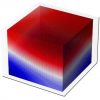The purpose of the course is to present the principles of science and technology, which form the basis of Integrated Solid and Hazardous Waste Management , with a main emphasis on Urban Solid Waste. The five individual systems of the solid waste management system will be presented: (1) Generation, (2) Interim storage and treatment at source, (3) Collection and transportation, (4) Processing, recovery and recovery of materials and energy, and (5) Disposal . After successful completion of this course, the student will be able to carry out a preliminary design, evaluation and combination of the various solid waste management systems mentioned above. The content of the course is as follows:
- Introduction and development in solid and hazardous waste management – definitions – European and Greek legislation
- Production (sources, types and composition) of municipal solid waste and hazardous waste
- Physical, chemical and biological characteristics of municipal solid waste and hazardous waste
- Temporarily store, sort and process at source – recycling
- Collection of municipal solid waste and source-separated materials – transport and transfer stations
- Size reduction, segregation of municipal solid waste and material recovery
- Mechanical sorting and processing facilities – mass balances
- Composting
- Anaerobic treatment
- Biological drying – the concept of mechanical-biological treatment (MBT)
- Heat treatment technologies
- Sanitary burial
- Strategies for selecting and combining technologies and specific solid waste streams
Evaluation method:
3-5 papers to be presented orally (remotely) during, and at the end of, the semester, either individually or in groups (grade weight 70%)
Final oral (remote) exam per student (30%).
Course material
- Slides, texts and accounting design sheets (in electronic format) that will be made available to the students.
- Material from internet
- Recommended books (optional).
